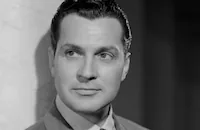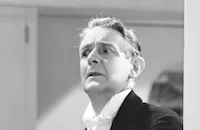Merrily We Go to Hell

Brief Synopsis
Cast & Crew
Dorothy Arzner
Sylvia Sidney
Fredric March
Adrianne Allen
Skeets Gallagher
George Irving
Film Details
Technical Specs

Synopsis
Chicago newspaper reporter and aspiring playwright Jerry Corbett and heiress Joan Prentice meet at a house party and fall in love. Despite Jerry's reputation as a drinker and his poor economic status, Joan accepts his marriage proposal. Joan's father does his best to prevent the union, offering Jerry money to back out, but Jerry refuses. When Jerry shows up late and drunk for their engagement party, everyone thinks Joan will see the error of her ways, but she remains steadfast and marries him. Jerry works on his plays at home and remains sober even while receiving rejection notices from publishers. Finally, Jerry's play When a Woman Says No is bought, and he and Joan go to New York for the production. The play stars Jerry's former flame, Claire Hempstead. The night of the premiere, Jerry becomes intoxicated and when his friend Buck brings him home in a stupor, Jerry mistakes Joan for Claire. Although she realizes Jerry started drinking again only when he was around Claire, Joan insists on staying with him in New York. When she finds him leaving one night to go to Claire's, she throws him out, but the next day, she informs him that she has decided to behave as if they had a modern marriage and so intends to take up with some lovers herself. So, while Jerry is making his usual "Merrily we go to hell" toast with Claire, Joan toasts the "holy state of matrimony--single lives, single beds and triple bromides in the morning" with her date, Charlie Baxter. On New Year's Eve, Joan finds out that she is pregnant, and is warned by the doctor of her poor physical condition. She tries to tell Jerry, but he is too preoccupied with Claire to listen, and so she leaves him. Jerry soon realizes that Claire means nothing to him, while Joan, to whom he has never professed his love, means everything. Jerry returns to Chicago, works again at the newspaper and remains sober, but Joan's father prevents any attempt he makes at contacting her. Finally, Jerry hears of Joan's pregnancy from the gossip columnist and rushes to the hospital. Joan's father attempts to prevent him from visiting her, even though she asks for him, but Jerry pushes his way through and finds his wife gravely ill. She has lost the baby, but Jerry has returned to give her his undying love.

Director

Dorothy Arzner
Cast

Sylvia Sidney

Fredric March
Adrianne Allen
Skeets Gallagher

George Irving
Esther Howard
Florence Britton
Charles Coleman

Cary Grant

Kent Taylor

Leonard Carey
Milla Davenport
Robert Greig
Reverend Neal Dodd
Mildred Boyd

Videos
Movie Clip
Hosted Intro
Film Details
Technical Specs

Articles
Merrily We Go to Hell -
Though sometimes mislabeled as a romantic comedy, Merrily We Go to Hell (1932) is actually a pre-Code melodrama about the pitfalls of marriage, particularly for women. The film provides an excellent example of the themes and style of Dorothy Arzner, the only female director to work within the studio system during the Golden Age of Hollywood.
Arzner directed many of the major actresses of the era, leading them to critical acclaim and award-winning performances. In Merrily We Go to Hell, Sylvia Sidney stars as Joan Prentice in a showy role that garnered her critical recognition early in her career. The daughter of a wealthy manufacturer, Joan is a sweet-natured innocent who meets working-class reporter Jerry Corbett at a hedonistic penthouse party. Like most of the partygoers, Jerry is so intoxicated that he can't see clearly, though he takes an immediate liking to Joan. Despite his misgivings and his problems with alcohol, Jerry courts and marries Joan. Fredric March costars as Jerry, and he plays the drinking scenes with a light touch. Jerry's banter with friends Buck and Vi, played by vaudevillian Skeets Gallagher and Broadway actress Esther Howard, as well as his physical fumbling while intoxicated are amusing. The film's misidentification as a romantic comedy likely stems from March's scenes as a drunken Jerry.
Jerry's drinking is related to unresolved feelings surrounding a broken love affair with ambitious Claire Hempstead, played by Adrianne Allen. At first, he and Joan are happy. So much so that Jerry stops drinking and writes a play, which is picked up by a Broadway producer. When Jerry and Joan travel to New York so that Jerry can work on rewrites, he is shocked to learn that Claire will be the star. Interaction with Claire triggers his drinking and leads to the inevitable. Instead of throwing Jerry out, Joan reacts by calling for a modern marriage, declaring, "If being a modern husband gives you privileges, it gives the modern wife privileges." However, living in an open marriage brings out the worst in both husband and wife.
The title Merrily We Go to Hell, which comes from a toast that Jerry repeats whenever his drinking has gotten the better of him, identifies the film as pre-Code. In the five years that made up the pre-Code era, several films included "hell" in the titles, suggesting the characters were willingly headed down the road to perdition. These films featured adultery, drinking to excess and a wanton pursuit of pleasure. The Motion Picture Production Code included a regulation against "salacious, indecent, or obscene titles," though Paramount ignored that guideline for Merrily We Go to Hell. A few newspaper editors balked at including advertising for the film because they felt the title was unduly sensational. In 1934, when the Code became mandatory, such titles would not have been considered, let alone adopted.
Merrily We Go to Hell joins a subset of pre-Code films in which open marriage or the double standard regarding sex are part of the storyline. In films such as Party Husband (1931), The Divorcee (1930), Ex-Lady (1933) and Illicit (1931), husbands and wives openly commit adultery under the noses of their partners without moral judgement passed on the women. Jerry may drink to excess, but this is not a film about his alcoholism. It's a film about his inability to handle commitment and responsibility, which has a detrimental impact on Joan's personality and behavior. Her decision to allow Jerry his affair with Claire and to dally with handsome men herself--including a backstage Romeo played by Cary Grant--results in her physical and emotional decline. A low point occurs when Jerry and Claire kiss passionately right in front of her and their circle of drunken friends. Despite Joan's slide into hedonism, the audience sympathizes with her, feels her humiliation and takes her side.
Merrily We Go to Hell reveals many of the themes and preoccupations found in Arzner's work, including the struggle with double standards and sexual equality in relationships. The film also reflects Arzner's tendency to intensify romantic conflicts though differences in social class and to illustrate the no-win battles over issues related to commitment. Dorothy Arzner was not the only director to traffic in these ideas and themes, but she was the only female director to do so in the Golden Age. As she said in an interview later in life, "Try as any man may, he will never be able to get the woman's viewpoint in directing certain stories. . . ."
As a director inside the studio system, she had to follow practices that defined the era, including the star system, the Production Code (after 1934) and the conventions of the classic narrative style. But within those systems and practices, she tweaked, scrutinized or challenged norms, because her perspective differed from that of her male colleagues. For example, the stars in her films played into their star images as expected. In Merrily We Go to Hell, Sylvia Sidney portrays another in a string of naïve and trusting characters who fall victim to unforeseen circumstances or self-serving men. However, under Arzner's direction, Sidney stretches beyond her star image as Joan gradually transforms from a hopeful, loving daughter into a disillusioned, contemptuous wife. Jerry remains likable because of March's leading man good looks and his light touch with the character, but it is Jerry's lack of commitment that damages the marriage--and Joan. Merrily We Go to Hell echoes other pre-Code dramas about open marriages and double standards, but in Arzner's film, it is male behavior that is scrutinized and found wanting.
The concrete, happy ending is an expected convention of Hollywood filmmaking, especially during the Golden Age. While Arzner's conclusions are cemented, her tendency to challenge norms gives her endings a troubling quality. The final lines of dialogue uttered by Sidney in Merrily We Go to Hell create an unsettling conclusion, perhaps drawing attention to whether the ending is indeed happy or not.
Given her unique position as the Golden Age's only female director, Arzner's themes and content tend to overshadow mention of her directorial talents. Merrily We Go to Hell belongs to the early sound era, when most directors struggled with the weaknesses of the sync-sound technology, but not Arzner. Reportedly, Arzner innovated the idea of the boom microphone to free the actors from those static compositions that plagued early sound films. Talky two-shots and dialogue-heavy long shots dominate Merrily We Go to Hell, but Arzner's mobile camera gives the film fluidity and visual interest. In the opening shot, the camera prowls across the rooftops of downtown Chicago before tracking right up to Jerry as he sits in front of a stash of liquor bottles. In other shots, the camera opens on a close-up then pans or tilts to reveal the principle character in the scene. Such graceful camerawork stands out in an era of stationary shots and stagy blocking. Merrily We Go to Hell represents a major work from a significant filmmaker.
By Susan Doll
Producer: Paramount Pictures (as Paramount Publix Corp.)
Director: Dorothy Arzner
Screenplay: Edwin Justus Mayer, adapted from the novel "I, Jerry, Take Thee, Joan" by Cleo Lucas
Cinematography: David Abel
Editing: Jane Loring
Music: Rudolph G. Kopp and John Leipold
Cast: Sylvia Sidney (Joan Prentice), Fredric March (Jerry Corbett), Adrianne Allen (Claire Hempstead), Richard "Skeets" Gallagher (Buck)), Esther Howard (Vi), George Irving (Mr. Prentice), Florence Britton (Charlcie), Kent Taylor (Gregory Boleslavsky), Charles Coleman (Damery), Cary Grant (Charlie Baxter), Theresa Harris (Powder Room Attendant)
1932 Black & White 83 mins.

Merrily We Go to Hell -
Quotes
Trivia
Notes
The working title of the film was Jerry and Joan. In the plot synopsis in the pressbook, Joan returns to Chicago after Jerry begins his drinking and his affair with Claire in New York. Joan attends a party in Chicago where she is confronted with Jerry and Claire boldly kissing. Joan tries to drown herself, but is rescued by a friend. Jerry finally comes to her side, and they reconcile. According to a news item in Film Daily, Jack Oakie was slated to appear in the film. Cary Grant's role was originally listed as "Stage leading man" in the copyright records and pressbook. According to a news item in Variety, the Los Angeles Times refused to print the title of the film in its advertisements, although it was printed in their review. No other newspapers refused the publicity.
















